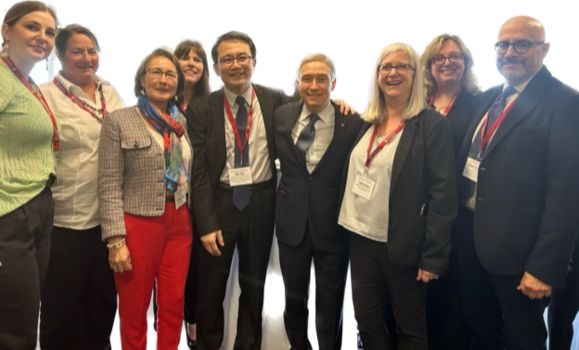News
» Go to news mainSchulich Law Participates in Qanittaq Clean Arctic Shipping Initiative

The Schulich School of Law is proud to announce its participation in the Qanittaq Clean Arctic Shipping Initiative which will help advance the governance of Arctic shipping in Canada.
On April 28, the Government of Canada announced a seven-year, $91M investment through the Canada First Research Excellence Fund (CFREF) grant program for the Qanittaq Clean Arctic Shipping Initiative, a unique partnership, co-led and co-developed by Memorial University and the Inuit Circumpolar Council (ICC) Canada. The project will address and respond to concerns about Arctic shipping and related environmental impacts affecting Northern communities.

“It is an honour to participate in the Qanittaq Clean Arctic Shipping Initiative to help advance the governance of Arctic shipping in Canada, and especially to build Inuit capacity to participate effectively in decisions that affect their homeland, Inuit Nunangat, in the spirit of reconciliation,” says Dr. Aldo Chircop, Schulich Law professor and governance theme leader. “This is a unique opportunity for the Marine & Environmental Law Institute (MELAW), Schulich Law and Dalhousie (in particular Industrial Engineering) to contribute research and education expertise in an unprecedented project.”
The Schulich School of Law and its Marine & Environmental Law Institute (MELAW) will partner with the Department of Industrial Engineering for the duration of the project. Activities will include several post-docs, graduate scholarships (PhD, LLM, other masters), JD research assistance, workshops at Dalhousie and in the North, training courses and publications (with a focus on open access).
The Schulich Law/MELAW faculty involved include Professors Sara Seck, Sara Ross, Constance MacIntosh, Naiomi Metallic, David VanderZwaag, and Patricia Galvao-Ferreria.
“The Schulich School of Law and MELAW are pleased to partner with other universities, the Inuit Circumpolar Council Canada, regulatory bodies and government to achieve solutions that will respond to concerns about Arctic shipping and related environmental impacts affecting Northern communities,” says Camille Cameron, Schulich Law Dean. “We look forward to being part of this collaborative project and to developing and contributing research expertise to advance the goals of the Qanittaq Clean Arctic Shipping Initiative.”
The project’s name and design are reflective of Inuit social values and Qaujisarnirmut (knowledge), and are built on a foundation of respectful coming together and use of every resource, network, technology, and process available, in order to arrive at the best collaborative solution to a challenge.
The vision for the project is to generate the knowledge to support safe and sustainable Arctic shipping. This work cannot be successfully completed without Inuit, industry and government partners. Co-development with Inuit organizations and input from local knowledge-holders will place Inuit priorities at the centre of the work as the initiative strives to develop knowledge and technology required for more sustainable, more efficient, and safer Arctic shipping, and the evidence to support the necessary policy changes. The initiative will create transformational change and enhance Canada’s position as a world-leader in Arctic shipping.
The Qanittaq initiative is co-developed with Inuit organizations and input from local knowledge-holders in the Arctic, and will support research led by Memorial University and various academic research teams across Canada, including the University of British Columbia, University of Ottawa, University of Montreal, and Dalhousie University. Since Arctic shipping is critical for the Inuit communities and vitally important for re-supply and economic development, the Qanittaq initiative has involved almost 50 partners and a dedicated knowledge mobilization and technology commercialization team to ensure the research has the intended long-lasting and tangible impacts.
The initiative will support engagement between Inuit, academia, industry, regulatory bodies and government such as the International Maritime Organization (IMO), Transport Canada, and the Canadian Coast Guard. Industry and government partners will be working collaboratively with the hybrid academic and Inuit research teams to develop the technology platforms necessary to accomplish the objectives and further update IMO’s Polar Code.
Recent News
- Assistant Professor Liam McHugh‑Russell ft in "Dispute at B.C. ports may reignite over employers' push on automation: expert"
- Professor Emeritus Wayne MacKay ft in "Legal column: What's the legal line between freedom of expression and hate speech?"
- Professor Emeritus Wayne MacKay ft in "The Todd Veinotte Show, July 8, 2024"
- Standing Up For The World
- Professor Emeritus Wayne MacKay ft in "Victim believes hate motivated downtown Halifax attack: ‘People will be terrified to hold their partner’s hand walking down the street’"
- Professor Emeritus Jocelyn Downie ft in "Opinion: Forced transfers for assisted dying are cruelty cloaked as compassion"
- Professor Emeritus Wayne MacKay ft in "Be practical, not idealistic to scrap partial‑day plans: expert"
- Professor Emeritus Jocelyn Downie ft in "A British Columbia court challenge to end forced transfer for medical assistance in dying"
